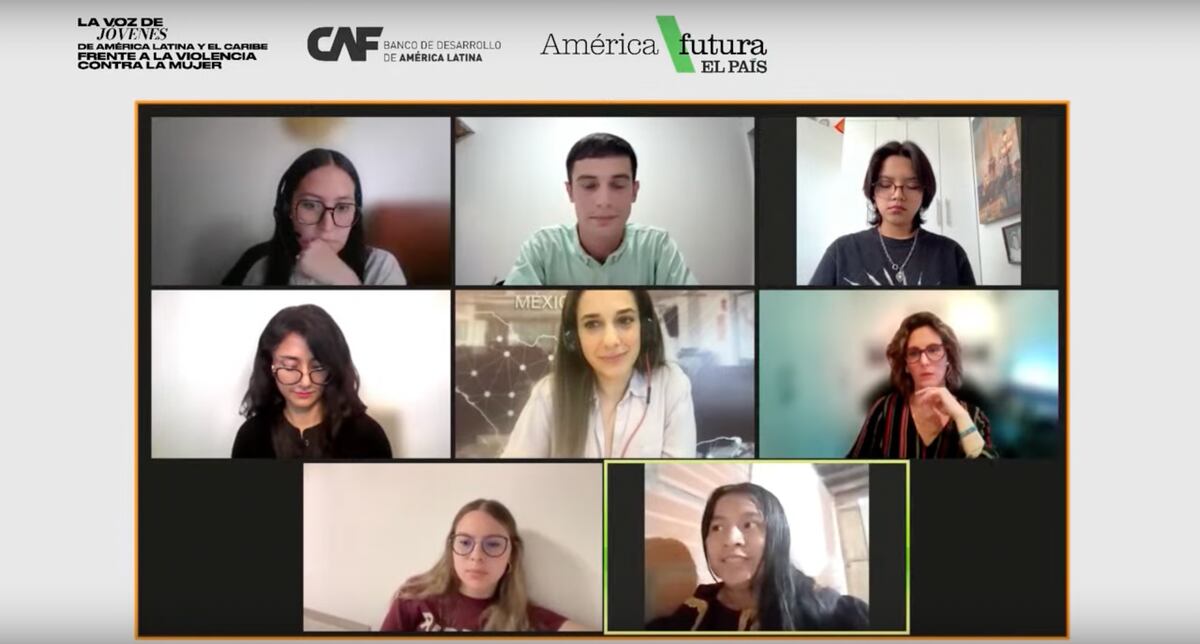Young people and authorities participate in the conservatory on gender violence and youth organized by América Futura and CAF.EL PAÍS
EL PAÍS offers the América Futura section open for its daily and global informative contribution on sustainable development.
If you want to support our journalism, subscribe
here
.
This Friday, as every November 25, the streets of the main cities of Latin America will be the scene of marches for the international day for the elimination of violence against women.
Thousands of Latin Americans will raise their voices to ask that they stop killing or assaulting them because of their gender.
According to the most recent data from the United Nations Economic Commission for Latin America and the Caribbean (Cepal), during 2020 more than 4,000 women were victims of femicide.
The murder of women because of their gender is the maximum expression of gender violence, but it manifests itself in many ways.
It can also be emotional and psychological, as recalled by Laurita Melo Benítez, a young woman from Bogotá (Colombia), who at the age of 28 has survived two relationships in which she was the victim of different types of violence.
Melo was part of the conversation
The voice of the youth of Latin America and the Caribbean against violence against women,
developed by América Futura and CAF-Latin American Development Bank this Wednesday.
1️⃣ Isolation
2️⃣ Ill-treatment that is increasing in frequency and intensity
3️⃣ Breakup attempts
4️⃣ Fear
5️⃣ Manipulation
Some warning signs reported by these young survivors.
Listen to them 👉 https://t.co/kirSTODWJq #25N @AmericaFutura pic.twitter.com/ad0HDJFTIT
— CAF (@AgendaCAF) November 23, 2022
Along with Melo, there were several young women who told their experiences of what it is like to live in a macho society, but they also gave clues on how to identify this type of violence and combat it.
“For me the most important word is limits,” Melo commented.
"That my opinion and my word are worth."
Likewise, Mónica Keragama, 20 years old and part of the Emberá Katío indigenous community in the department of Risaralda, also in Colombia, told how, together with her mother, she opposed the idea that her father had of marrying her off when she was only 13 years.
In addition to the support of her mother, the young woman highlighted the value she found in herself.
Today she has managed to graduate with a bachelor's degree, she is the general secretary of the town council of her community and she dreams of studying a career related to human rights or medicine.
The marriage of girls and adolescents is another of the forms that gender violence takes in the region.
According to data from World Vision, in Latin America and the Caribbean, 60 million women were married before their 18th birthday.
During the event, in which young people from Chile and Panama also participated, as well as experts and authorities, they talked about how the fight against gender-based violence implies not only individual changes but also at a social level.
Luciana Fainstain, a specialist from CAF's Department of Gender, Inclusion and Diversity, recalled, for example, that sustainable development is also human development, therefore neither of them can be achieved if there is no justice and gender equality.
According to her, gender violence is possible due to "behaviors, attitudes, and beliefs that have become naturalized," so intervening in public policies that challenge these ideas is important for the region.
In Uruguay, said Solana Quesada, director of the Consultancy for Gender Equality of the Municipality of Montevideo, there is a Law on violence against women based on gender, which typifies 18 forms of gender violence that go beyond what is produces in the couple.
This law, she added, expanded support services for women, and allows them to have free psychosocial and legal help.
However, as Anya Victoria Delgado, director of the regional project on gender violence of the Pan American Foundation, pointed out, "although Latin America and the Caribbean have very advanced legal frameworks against gender violence, they are not implemented."
One point that was at the center of the discussion, however, was how to ensure that women who are being violated are not alone, since psychological abuse and control by their ex-partners have often led them to lose their networks. support, friends and family.
When denouncing, said the young people, what is common is not having anyone to accompany or advise them.
Not even knowing where to start a legal process.
Even not knowing that they have the right to receive help.
Given this, Delgado recommended a tool: a digital directory of organizations that offer accompaniment services in the region, Juntas de Norte a Sur.
In the end, feminism and support networks, as Gianella Valenzuela, an 18-year-old Chilean and part of Tremendas, a platform with a presence in 20 Latin American countries that seeks to promote the voice of girls, said, "are a tool to to be able to develop in a society that makes it difficult and is violent”.

